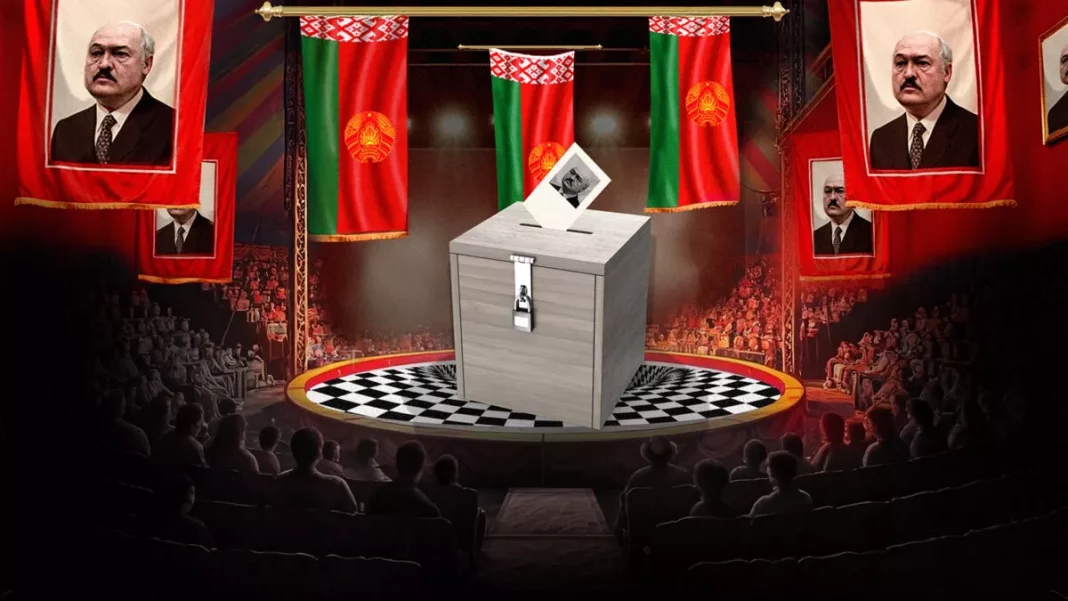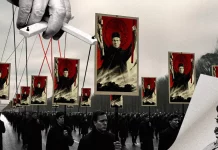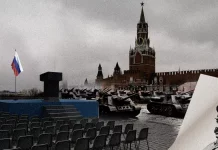By EUvsDisinfo
A seventh term for Lukashenka
The 70-year-old Belarusian autocrat, reigning in Minsk since 1994, is preparing to stage a coronation for yet another five-year term, totalling a potential 35 years in power.
After falsifying the results of the elections in August 2020, Lukashenka has preserved his power thanks to two factors: brutal repression of the country’s pro-democracy demonstrations and political and economic support from Russia.
To prevent similar large-scale unrest to that of 2020, Lukashenka has sought to eradicate civil society in Belarus, dissolved all political opposition parties, and intimidated the Belarusian society through consistent violations of basic human rights and freedoms.
We have described the worrying developments in Belarus in our earlier accounts here, here, and here. This time, Lukashenka’s re-appointment procedure, officially called a ’presidential election’ and scheduled for 26 January 2025, looks more absurd than ever. No genuine alternative candidates are running; only four nominal ones who avoid criticising Lukashenka’s policies and instead prefer targeting the regime’s real political opponents.
Lukashenka’s ‘political programme’ praises the achievements of his 30-year-long rule, slams Western sanctions and NATO, and claims that ‘the whole world around us is on fire’, so he promises to prioritise relations with Russia as well as to restore dialogue with the West.
Campaigning theatre: 7 seconds…
Despite the tragi-comical status of the so-called ‘alternative’ candidates, Belarus’ state outlets have tried hard to avoid mentioning their names and electoral agenda during the electoral campaign. Lukashenka’s regime has been unwilling to incite the slightest public interest in the ‘elections’ and has done its best to make the campaign a non-event barely visible to the public.
The only very brief mention of the fact that any ‘alternative candidate’ existed at all lasted only 7 seconds on state TV, where it was mentioned that they were given an opportunity to make short speeches on public television. The reporting that followed spoke about state scholarships which Lukashenka awarded to a group of talented youth and presented an analysis of his speeches.
… and another 3 seconds
Similarly, another state TV report dedicated to the ‘election’, or as it called it, the ‘main political event of the year’, preferred focusing on the ‘election’ timeline. Everything was going according to schedule and the situation was ‘smooth and calm’, the newsreader reassured. Three seconds of the report’s airtime provided very attentive viewers with a hint that other names besides Lukashenka’s would appear on the ballot.
Three seconds is how long a booth with leaflets of the five candidates, located at one of the polling stations, was shown on TV. Otherwise, the report said nothing about the number of nominal presidential candidates, let alone their names.
The TV report gave more generous airtime to the director of the school which hosted the polling station. In a style similar to ‘Thank you, Great Leader’, the director elaborated on how well the school venue had been renovated, assuring TV viewers that the new carpets and lighting would ‘certainly create a festive atmosphere and positive mood among voters’.
Wall-to-wall coverage of Lukashenka
Whereas the state outlets have been extremely reluctant to even mention the names of the ‘alternative’ candidates, Lukashenka has consistently dominated daily reporting on all state platforms. His December 2024 visits to Oman, the United Arab Emirates and Russia were extensively covered and the state outlets tried hard to show Lukashenka in good physical shape. Among other things, they claimed that Lukashenka had chopped a big pile of wood ahead of the EAEU summit in Saint Petersburg. In previous years, Belarusian viewers would see Lukashenka play ice hockey but that seems too risky for a 70-year-old.
Other propaganda programmes even went a step further, alleging that elections were actually a nuisance for the great ruler who ‘is just focused on doing his job’ and ‘cares more about the benefit of the country when he’s on [foreign] trips than about his electoral ego’.
Pretend legitimacy
Of course, Lukashenka will be pronounced the winner after 26 January, but behind all the posturing lies a dilemma. The regime desires to have as many Belarusians showing up at the polling stations to claim legitimacy while also keeping the election a non-event to prevent even the slightest challenge to Lukashenka.
As part of the pro-Lukashenka campaign, the state outlets consistently reported about the so-called ‘Unity Marathon’, a series of cultural propaganda events which were organised across the whole country from October 2024 until January 2025.
The ‘Unity Marathon’ events were called ‘a gift from our head of state to the Belarusian people’ by Lukashenka’s close associate Natallia Kachanava. They included talk shows with state propagandists and large posters praising the outcomes of Lukashenka’s 30-year-long rule.
State TV reports invariably claimed that the ‘Unity Marathon’ events were highly popular among locals, whereas footage released by state TV showed rather limited participation.
Who are the ‘international observers’?
Selected puppet ‘international observers’ are going to be as bizarre as the ‘election’ and the reporting by state outlets.
OSCE was invited only 10 days ahead of 26 January, which made it impossible to launch a proper election observation mission. On 9 January, the OSCE Office for Democratic Institutions and Human Rights and the Parliamentary Assembly publicly announced that Belarus had not invited the OSCE’s participating states to observe the process. The OSCE statement regretted that the absence of observers would prevent an impartial and independent assessment of the election process. For over 20, the OSCE observer missions have found each presidential, parliamentary and local Belarusian election short of respecting international standards. OSCE reconfirmed their statement from 9 January.
One propaganda programme on Belarusian state TV was quite outspoken in this regard, saying: ‘Are you looking for any dust or dirt? As per usual, Western observers are bringing dirt on their boots to our clean house’. However, some other state outlets seemed to deceive viewers into believing that renowned international observers would be present.
The day after the OSCE statement was released, the state TV report did not mention it, saying instead ‘We are waiting for international observers who are capable to give an objective assessment [of the electoral process]. For the first time our Election Code has been translated into English for foreigners’ use’. The same TV report claimed that 362 international observers from 40 countries had been accredited in Belarus by that time. Those are most likely individuals invited in their private capacity, including some Lukashenka supporters from EU countries, and those belonging to the Russia-led observation mission of the Commonwealth of Independent States (CIS/SNG), an organisation consisting of nine post-Soviet states with administrative seats in Moscow and Minsk.
Hired hands doing imitation
Leanid Anfimau, chairman of the CIS observer mission, lauded Belarus’s preparedness to carry out electoral processes ‘in accordance with international norms and democratic standards’. Prior to becoming a CIS official in 2021, Anfimau was Lukashenko’s subordinate who chaired Belarus’s supreme financial control body, called the State Control Committee, for many years. It was this agency that in June 2020 detained Viktar Babaryka, one of the 2020 key presidential candidates, on his way to the Central Electoral Commission. Babaryka was later sentenced to 14 years of imprisonment on politically motivated charges and remains behind bars.
The former head of the Central Election Committee for 25 years, Lydia Ermoshina, and a selection of other propagandists are also very active in promoting Lukashenka.
Lukashenka’s electoral concerns – hide the crime
Despite continued large-scale repression, the Lukashenka regime remains committed to avoid any unexpected events. Electoral reporting by state media has focussed greatly on so-called ‘electoral security’, and mentioned several specific concerns. ‘Destructive attempts from abroad’ to promote the idea of an election boycott was one of them. Another was related to ensuring that the names of the members of the country’s election commissions were not made public in order to protect them from ‘aggressive influences’, as the head of the Central Election Commission, Ihar Karpenka, argued.
The Lukashenka regime also banned taking photos and videos of filled-out ballots to prevent the same kind of effective verification system of election fraud that Belarus’ democratic forces successfully carried out during the 2020 presidential election. As a state TV report said, a picture of a ballot ‘does not really carry any meaning, but only serves as a pretext for fugitive extremists to stir up a ruckus’.
Further, no polling stations in foreign countries were opened to prevent the sizable Belarusian diaspora from taking part in the ‘election’. As one propagandist argued, ‘Today, our citizens abroad are under unprecedented pressure. Their sentiments are manipulated, and they cannot fully rely on their own interests and the interests of the country’.
In this so-called presidential election, bizarrely covered by the state platforms and monitored by grotesque ‘international observers’, Lukashenka is guaranteed to come out ‘triumphant’.
By EUvsDisinfo





